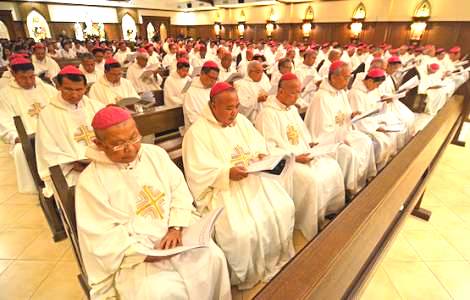Bishops’ fitting response to ‘cruel words’

FIDES PHOTO
The Catholic Bishops’ Conference of the Philippines asked for the people’s understanding for their “collective silence over many disturbing issues (that) urgently needed our spiritual and pastoral guidance.”
Diagnosis and prognosis: In prayerful discernment of the signs of the times, the Filipino bishops interpreted the events of the recent past in the light of the Gospel (Vatican Council II, Gaudium et Spes, 4). That is diagnosis.
Their only desire is to offer spiritual and pastoral guidance for a better Philippines and hopefully a new beginning for the Filipino Church. That is prognosis.
Prayer and discernment cannot and should not be done in a hurry, I suppose. “Forgive us for the length of time that it took us to find our collective voice,” said the Filipino bishops. “We too needed to be guided properly in prayer and discernment before we could guide you.”
Still mourning the death of many innocent victims in the Jolo twin bombings, after a long prayerful reflection, the Filipino bishops issued a pastoral statement to “our dear People of God,” meant to respond to the presidential “cruel words that pierce into the soul of the Catholic Church like sharp daggers” (CBCP, January 28, 2019).
As always, the Filipino bishops’ pastoral guidance for all is to imitate Christ. “Conquer evil with good” (Romans 12:21), they urged.
The Filipino bishops, in imitatio Christi, rejected once and for all the principle Lex Talionis that says: “An eye for an eye, a tooth for a tooth,” the “tit for tat” principle taken the code attributed to Hammurabi who ruled Babylon from 2285-2242 B.C.
In effect, the Filipino bishops teach us what would Jesus do (WWJD): “When someone strikes you on your right cheek, offer the other one to him as well… Love your enemies, do good to those who hate you” (Matthew 5: 38-48).
The Catholic hierarchy is credible a hundredfold when its only strength and power come from the Lord, apparently the first lesson the bishops learned from history!
Admitting their shortcomings
BTW, aren’t bishops, collectively, successors of the Apostles, and the cardinals are “Princes of the Church?” So why kneel down if you could stand up in command? Why beg for mercy when the Church is puissant in both socio-political and temporal affairs?
The Filipino bishops knew better. They have decided to choose the path of healing, and healing comes via the path of humble admission of shortcomings.
The Filipino bishops admitted that, like all leaders of any other human institution, they bow “in shame when we hear of abuses committed by some of (us), we hold ourselves accountable for their actions, and accept our duty to correct them…”
They went further in humility and meekness: “When people do not understand our essential doctrines as Roman Catholic Christians, we have also ourselves to blame. It could also mean we have failed in our preaching. Perhaps we have not been effective enough in our catechesis about the faith?”
The Filipino bishops applied the healing remedies to the fetid wounds of the Church, hoping that by acknowledging the truth and saying sorry in public they promised a ray of hope to a tired and desperate world.
Their prophetic role
“We have no intention of interfering in the conduct of State affairs,” confessed the Filipino bishops, “but neither do we intend to abdicate our sacred mandate as shepherds to whom the Lord has entrusted his flock… We do not fight with arms. We fight only with the truth.”
For 2,000 years, the Roman Catholic Church has remained the bearer of truth and salvation, outlasting all types of human obstacles and all kinds of oppressive governments since the First Pentecost.
The Filipino bishops defined their prophetic role: “Therefore, no amount of intimidation or even threat to our lives will make us give up our prophetic role, especially that of giving voice to the voiceless. As Paul once said, ‘Woe to me if I don’t preach the Gospel!’”
The Devil is the enemy and “the battles that we fight are spiritual” (Ephesians 6:10-17). Satan, the Father of lies, rears its ugly head every once in a while to make aggressive attempts to destroy the Catholic Church, his back never broken, his fiendish desire unsatisfied.
I am a Catholic and a Filipino, and will always be on the side of the Filipino bishops because I believe in the promise made by our dear Lord: “And the gates of Hell shall not prevail” (Matthew 16:19). Amen!
Jose Mario Bautista Maximiano (jomaximiano@gmail.com) is the author of 500 Years Roman Catholic: The Future of the Filipino Church (2020).

